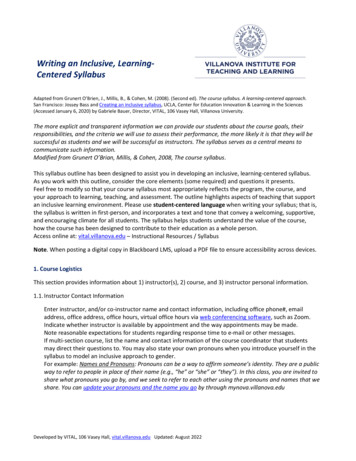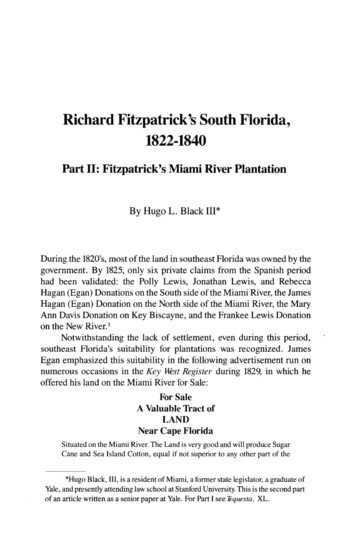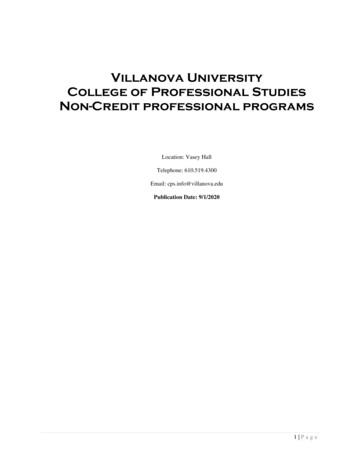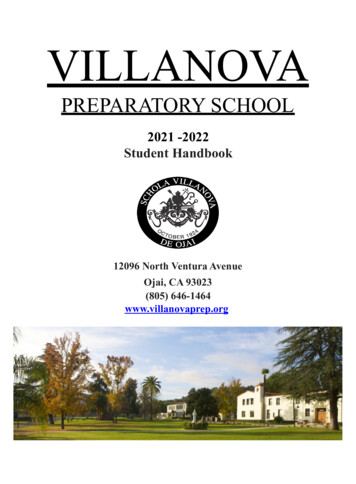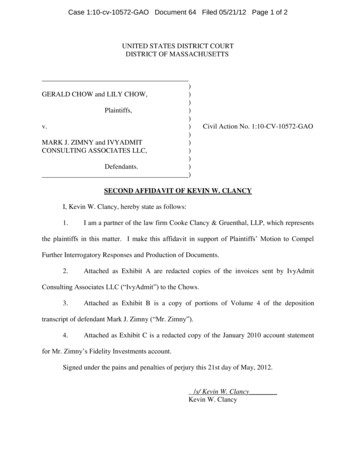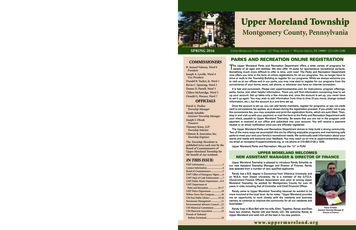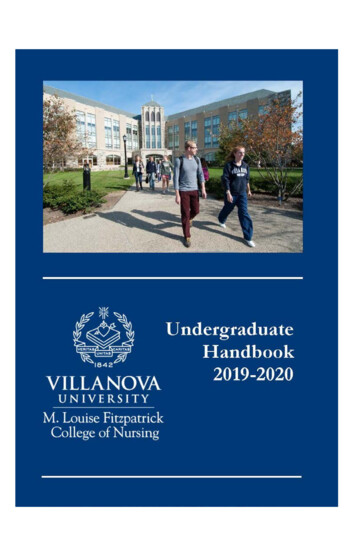
Transcription
M. Louise FitzpatrickCollege of Nursing OfficesDriscoll Hall – 610-519-4900Simulation and Learning Resource Center – 610-519-4925Revised 8/19
The M. Louise Fitzpatrick College of Nursing has incorporatedprofessional standards of practice into Undergraduate and Graduatenursing curricula.Documents utilized for this purpose include but are not limited to:Undergraduate Program Professional Standards and Guidelines ANA Code of Ethics (2015)Genetics and Genomics Nursing: Scope and Standards of Practice(International Society of Nurses in Genetics, Inc. & the ANA,2016)Global Health Competencies for Nurses in the Americas (Wilsonet al., 2012)Home Health Nursing: Scope and Standards of Practice (2014)Guidelines for Perinatal Care (American Academy of Pediatricsand American College of Obstetrics and Gynecologists, 2017)Nursing: Scope and Standards of Practice (ANA, 2015)Pediatric Nursing: Scope and Standards of Practice (ANA,NAPNAP, SPN, 2015)Psychiatric-Mental Health Nursing: Scope and Standards ofPractice (2nd Edition) (American Psychiatric Nurses Association,ANA, SPN 2014)Public Health Nursing: Scope and Standards of Practice (2013)Standards for Professional Nursing Practice in the Care ofWomen and Newborns (AWHONN, 2009)The Essentials of Baccalaureate Education for ProfessionalNursing Practice (AACN, 2008)While this handbook was prepared based on the best informationavailable at the time of publication, all information is subject to changewithout notice or obligation.
Table of ContentsINTRODUCTION .8Fact Sheet .8M. Louise Fitzpatrick College of Nursing Mission Statement .11M. Louise Fitzpatrick College of Nursing Goals .12M. Louise Fitzpatrick College of Nursing Philosophy .13THE CURRICULUM .14Organizing Framework for the M. Louise Fitzpatrick College of Nursing:Core Nursing Knowledge for the 21st Century .14Foundational Knowledge.16Core Nursing Knowledge .16Definitions for Core Competencies .16Evidence-Based Practice .17Patient-Centered Care.17Clinical Reasoning .17Patient Care Skills .17Spiritually-Centered Care .17Cultural Humility .17Information Technology and Application of Patient Care Technology .17Communication .18Professional Formation .18Professional Values .18Accountability .18Social Responsibility .18Advocacy.18Leadership .18Collegiality .19Interprofessional Collaboration .19Role Transition .19Scholarly Analytical Skills .19Service Orientation .19BSN Program Outcomes .21Undergraduate Curriculum Plan.22Required Courses .23Elective Courses .23Global Health Minor .24THE FACULTY .24Professor Course Evaluation .25Complaints about Faculty and Grades.25Grievance Procedure .26Administration of the College of Nursing .26Advisement System .26The Value of Knowing the Advisor .26POLICIES AND PROCEDURES .27Academic Requirements for Retention and Graduation .27Academic Policies .27
Probation .29Dismissal .30Academic Advancement Progression .30Advanced Placement .30Registration Policies.31Undergraduate Students Enrolling in Graduate Level Courses .31Satisfactory/Unsatisfactory .32Admission to Closed Sections of Courses .32Program Requirements .32Dean’s List and Graduating with Honors .33Grading System .33Authorized Withdrawal from a Course .34Scholastic Load .35Study Abroad Opportunities.35Withdrawal from the University and Leave of Absence .35Leave of Absence (LOA): .36Medical Leave of Absence (MLOA): .36Withdrawal from the University: .36Unauthorized Withdrawal: .36Transfer Students .36Transfer Credit from Another University: .37RN-BSN Online Program Studies .37State Authorization for Online Education Programs .37Admission Requirements.37Transfer of Liberal Education Course Credit .38CLEP Policy .38Academic Advisement.38RN-BSN Curriculum Plan .39STUDENT RESPONSIBILITIES WHILE IN THE M. LOUISE FITZPATRICKCOLLEGE OF NURSING .41Attendance .41Clinical and Laboratory Absence Make-Up Procedure .41Promptness .41Preparation .41Professional and Academic Responsibilities of Students .42Student Employment .43M. Louise Fitzpatrick College of Nursing Social Media Policy.43Introduction .43Social Media Tips.44Academic Integrity Code .45Academic Integrity Policy .45Inter-Collegiate Sports Involvement .45Student Records .45Student Health Requirements .45Clinical Laboratory Preparation .46Needlestick Policy .46Fees and Expenses.46
Transportation .48NURSING LICENSURE INSTRUCTIONS.49Applying for Licensure in Pennsylvania .49Applying for Licensure in other States.51Licensure in Compact States .52Applying for the NCLEX RN Examination .52Temporary Practice Permits .53Pointers for NCLEX Preparation .53STUDENT UNIFORMS .55Nursing Laboratory Appearance .55Clinical Laboratory / Agency Appearance .55Full Uniform .55Professional Appearance .56College of Nursing Pin .56RESOURCES AND FACILITIES .57Simulation and Learning Resource Center .57Clinical/Simulation Laboratories .57Student Regulations for the Simulation and Learning Resource Center .58Nursing Skills Development .58Sign-out Policy .58The Patricia B. and Gary M. Holloway University Counseling Center .58Student Health .59Office of Financial Assistance .59Air Force ROTC .60Army ROTC .60Navy ROTC .61Student Organizations .63Undergraduate Nursing Senate .63The National Student Nurses’ Association, The State Student Nurses’Association of Pennsylvania (SNAP), and Villanova University’s Chapterof the Student Nurses’ Association of Pennsylvania (SNAP-Villanova) .64Chi Eta Phi Sorority .66Nurses Without Borders .66Student Government Association (SGA).66Honors and Awards .66Sigma Theta Tau International Honor Society .67APPENDIX A: POLICY ON CRIMINAL BACKGROUND CHECK FORMATRICULATING STUDENTS .68APPENDIX B: PROCEDURE - BLOOD BORNE PATHOGEN EXPOSUREINCIDENTS .71APPENDIX C: FACILITIES FOR INSTRUCTIONS AND PRACTICE .75N O T E S .76
The Student Handbook of the M. Louise Fitzpatrick College of Nursing preparedby a committee of students and faculty is designed to provide each student withinformation which will serve as a guide through completion of the academicprogram at Villanova.The M. Louise Fitzpatrick College of Nursing is approved by the State Board ofNursing of Pennsylvania and the baccalaureate degree in nursing program isaccredited by the Commission on Collegiate Nursing Education*. The Collegemaintains high standards and enjoys a fine reputation in the academic andprofessional community.Students represent the College of Nursing on campus and contribute to its publicimage. In addition to useful information concerning the curriculum, studentactivities, facilities in the college and resources available, this handbook containsuseful information about student responsibilities. It is to the student’s benefit toread it thoroughly and to keep it handy as a reference throughout the program.Donna Sullivan Havens, PhD,RN, FAANConnelly Endowed Dean andProfessorLesley A. Perry, PhD, RNAssociate Dean for AcademicAffairs and ProfessorAngelina A. Arcamone, PhD, RNAssociate Dean of theUndergraduate Program andClinical Assistant ProfessorAnne Fink, PhD, RN,CNEAssistant Dean for College andStudent Services, Director of theLEAD Professional DevelopmentProgram, and Assistant ProfessorMargaret Lyons, DNP, RN, CRNIDirector, RN-BSN Online Trackand Clinical Assistant ProfessorColleen Meakim, MSN, RN,CHSEDirector, Second Degree BSNTrack and Assistant Professor ofPracticeBarbara Stephen, MSN, RN,OCNDirector, Traditional andTransfer BSN Track and AssistantProfessor of PracticeFrancis Amorim, MSN, RN, CCECoordinator for ClinicalEducation and Clinical AssistantProfessor of Practice*Commonwealth of Pennsylvania, Department of State Bureau of Professionaland Occupational Affairs, State Board of Nursing, P. O. Box 2649, Harrisburg,PA 17105-2649Phone: 717-783-7142Commission on Collegiate Nursing Education, 655 K Street NW, Suite 750,Washington, DC 20001Phone: 202-887-6791
INTRODUCTIONFact SheetVillanova University, located in the Philadelphia suburbs, is a co-educationalinstitution founded in 1842 by the Augustinian Order of the Roman CatholicChurch.The M. Louise Fitzpatrick College of Nursing was established in 1953, isapproved by the State Board of Nursing of Pennsylvania and the baccalaureatedegree in nursing program is accredited by the Commission on CollegiateNursing Education.The undergraduate student body of the College of Nursing numbersapproximately 90 - 120 students per class.The College of Nursing faculty has outstanding representation in local, state, andnational professional organizations. The majority of the faculty are doctorallyprepared.Personalized attention is given to students through: an academic advisementsystem of 15-20 students per faculty member, and a faculty-student ratio of 1:8students in the clinical agencies.The College of Nursing is affiliated with more than 75 clinical and teachingagencies. These include large medical centers, community hospitals, extendedcare facilities, home health agencies, schools, industrial health centers, schools ofnursing, senior citizen centers, and community health centers.A state-of-the-art Simulation and Learning Resource Center provides the latest inmulti-media and materials, as well as clinical simulation labs for healthassessment, adult health, maternal/child health, anesthesia, and critical care.Full-time staff is employed to coordinate the center. Electronic recording ofstudents’ simulation experiences augments individualized learning andevaluation.In 1981, the College of Nursing instituted a Master's Degree Program in Nursingdesigned to prepare students for leadership roles in nursing. The program hasgrown dramatically over the years in response to trends in health care andchanging health care needs in society. From its early emphasis on the preparationof administrators and educators, the Graduate Program has expanded to preparenurses for advanced practice roles as nurse practitioners and nurse anesthetists inan ever-changing health care environment. The Program's reputation for qualityis reflected in the graduates and the roles they assume.Recently, U.S. News and World Report ranked the Graduate Nursing Program8
among the "top 50" Graduate Nursing Programs in the country. Part-time andfull-time study is available.In 2003, the College of Nursing admitted its first students to an acceleratedprogram specifically designed for college graduates with degrees in otherdisciplines. The BSNExpress incorporated the standard components of thenursing program in a concentrated time frame that begins in May of each yearand ends in August of the following year.In 2004, the College of Nursing initiated a Doctoral Program and awards a Ph.D.in Nursing. The program is designed to prepare nurses as educators andresearchers for academic careers in higher education. In 2012, a post-master’sDoctor of Nursing practice (DNP) was initiated for advanced practice nurses,such as nurse practitioners, registered nurse anesthetists, clinical nursespecialists, certified nurse midwives, and nursing administrators. Beginning inJanuary 2019, a post-baccalaureate Doctor of Nursing Practice program forNurse Anesthetists began. Although, RN students have been able to completetheir BSN program on campus since 1953, in 2013, an online RN-BSN programwas initiated. This program will end Fall 2021.The College of Nursing has a nationally accredited Program of ContinuingEducation. This program offers a wide variety of workshops, seminars,conferences, and short courses to over 700 nurses each year. An AnnualDistinguished Lecture in Nursing is very well attended by the Philadelphia areanursing community.There are many opportunities for student involvement in academic professional,and honors organizations. Examples include: The Undergraduate Nursing Senate,Student Nurses' Association of Pennsylvania (SNAP), Chi Eta Phi, Nurseswithout Borders, Sigma Theta Tau (Alpha Nu Chapter), and the graduate nursingorganization (The Network). Students are active participants in all areas of theuniversity.Villanova graduates are sought after by employers of nurses in all parts of thecountry.THE M. LOUISE FITZPATRICK COLLEGE OF NURSINGSince 1953, the M. Louise Fitzpatrick College of Nursing of VillanovaUniversity has prepared graduates whose contributions influence the directionand values of health care delivery in an ever-changing society.The College holds the belief that professional nursing provides a significantservice to society through its concern with the promotion, maintenance andrestoration of health.9
Baccalaureate education prepares individuals for professional nursing practice ina variety of health settings and for continuous personal and educational growth,including entrance into graduate education in nursing.The College of Nursing offers a program of study leading to the degree ofBachelor of Science in Nursing. The program integrates a liberal education withthe ideals, knowledge, and skills of professional nursing practices under thedirection of qualified faculty.The M. Louise Fitzpatrick College of Nursing is approved by the State Board ofNursing of Pennsylvania and the baccalaureate degree in nursing program isaccredited by the Commission on Collegiate Nursing Education1.Upon completion of the prescribed program of study, graduates are eligible totake the National Council of State Boards of Nursing Licensure Examination(NCLEX) for licensure as a professional registered nurse.Programs leading to a Master's Degree in Nursing, a Ph.D. in Nursing and a DNPin Nursing are also offered through the College of Nursing.In 2008, the College of Nursing moved to its new home in Driscoll Hall.In December 2017, the University President, the Rev. Peter M. Donohue, OSA,PhD, announced the naming of the College in memory of the Connelly EndowedDean and Professor, M. Louise Fitzpatrick, PhD, RN, FAAN. Dean Fitzpatrickserved as Dean for nearly 40 years. Only the second named college in VillanovaUniversity’s history, the College was named the M. Louise Fitzpatrick Collegeof Nursing.The College of Nursing, cognizant of the diverse learning needs of individualsengaged in nursing practice, education and the administration of nursing andhealth care services, addresses these concerns through its Program in ContinuingEducation. A wide variety of workshops, seminars, conferences, and shortcourses are offered by experts in the field. Through this program, the College ofNursing collaborates with health practitioners and agencies in advancing andmaintaining the quality of health care for people.1All nursing programs in Pennsylvania are periodically reviewed and revisited bythe State Board of Nurse Examiners for purposes of State approval. Accreditationis renewed every ten years by the Commission on Collegiate Nursing Education. Inpreparation for accreditation, a comprehensive report is written by faculty withstudent participation and the representatives from the Commission on CollegiateNursing Education visit campus.10
M. Louise Fitzpatrick College of Nursing Mission StatementThe M. Louise Fitzpatrick College of Nursing is a tangible expression ofVillanova University's mission, tradition, and commitment to human service. Asa major school of nursing under Catholic auspices, it carries responsibility for theeducation of nurses within the framework of Christian beliefs and values and theheritage of the Order of St. Augustine. The College of Nursing interprets nursingas a healing ministry emanated by love and demonstrated through service and thecare of others. As a healing art as well as an applied science and practicediscipline, nursing as taught at Villanova University emphasizes the concern forspiritual health as well as that of mind and body. Curricula reflect the integrationof these elements and their application in clinical practice, and concern for othersregardless of race, ethnicity, or religion. The College of Nursing educatesindividuals for service to a diverse society including all sectors and strata of thepopulation; as such, graduates are prepared to assume roles in all settings wherehealth care is delivered.Within this context, nursing draws its worth and spirit from motives based onlove of one's fellow men and women who are made in the image and likeness ofGod. As a social service to the community, nursing responds to the needs of thesick, poor and disabled, and promotes wellness as the pre-eminent goal ofnursing care. The practice of nursing within a Christian environment requiresthat those who nurse recognize and respect the needs of each person and thatthey teach while they nurse to assist their patients and the community to achievethe highest possible level of wellness of body, mind, and spirit.The College of Nursing, consistent with the mission of Villanova University,assumes responsibility for the education of individuals who will be prepared toprovide a vital service to society and who are liberally educated, clinicallycompetent, compassionate, and ethically motivated. The college is committed toproviding high quality education in the liberal arts and sciences and expertpreparation in the knowledge and clinical skills of professional nursing toqualified individuals who must be prepared and empowered to confront thehealth care demands of a complex and technologically advanced society.The College views itself as an important locus of education, scholarship, andorganizational leadership within Nursing's professional and educationalcommunities. It views with great seriousness its prominent role within theconstellation of collegiate nursing programs under Catholic auspices.The College awards the Bachelor of Science in Nursing (BSN) degree andprovides basic preparation in nursing to those who are studying for the firstprofessional degree in the field. Such students include high school graduates withno prior college experience, registered nurses who have not yet attained thebaccalaureate degree, college graduates with degrees in other disciplines who11
have decided to study nursing, and adults who are studying for their first collegedegree.The Graduate Program awards the Master of Science in Nursing (MSN) degreeand provides preparation and leadership development in selected areas ofadvanced nursing practice, development of research skills, and knowledge ofhealth policy. In addition, course options prepare individuals for positions aseducators, nurse practitioners, and nurse anesthetists.The Graduate Program administers the Doctor of Philosophy in Nursing (PhD)degree, which is designed to prepare nurses as educators and researchers foracademic careers in higher education. The Doctoral Program at Villanova isunique in that it focuses on the application of advanced nursing knowledge andscholarly inquiry that address professional and practice concerns related to thelearning process.The Graduate Program also administers the Doctor of Nursing Practice (DNP)degree, which is a practice focused doctoral program designed for the PostMaster’s Advanced Practice Registered Nurses (APRNs) to lead innovation innursing practice and healthcare. A post-baccalaureate track in the DNP Programto prepare nurse anesthetists began in January 2019.The Continuing Education Program is committed to providing quality programsthat enhance the professional growth and update the knowledge base of nurses,other health care professionals, and the public on topics related to health care.The M. Louise Fitzpatrick College of Nursing’s emphasis on education in valuesand ethical principles is a pervasive and central theme and emanates from theCatholic and Augustinian tradition of the University. The faculty are expected toserve as role models and mentors for the professional development of students inthe exercise of their academic responsibilities.M. Louise Fitzpatrick College of Nursing Goals1.To serve the health needs of society through the education of competentnurses prepared at the undergraduate and graduate levels and through theprovision of continuing education for practicing nurses all of whom valueevidence-based practice.2.To enhance the intellectual life and scholarly productivity of the College ofNursing.3.To assure quality in instruction and student performance.4.To provide leadership to the profession in the area of ethics, human12
values, and spiritual dimensions of health care.5.To ensure the economic viability of the College through cost effectiveoperations and increased extramural funding.6.To contribute to the goals of the university in the areas of academicexcellence, technology, faculty development, student life, and service to theinternal and external communities.7.To foster a spirit of collaboration, community, and respect within the contextof Catholic, Augustinian values.8.To encourage professi
The College of Nursing offers a program of study leading to the degree of Bachelor of Science in Nursing. The program integrates a liberal education with the ideals, knowledge, and skills of professional nursing practices under the direction of qualified faculty. The M. Louise Fitzpatrick College of Nursing is approved by the State Board of
